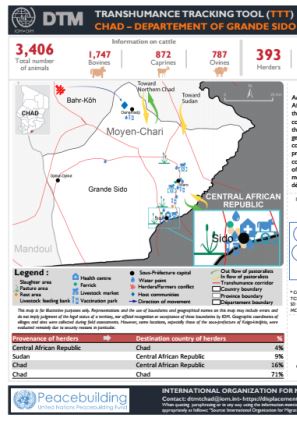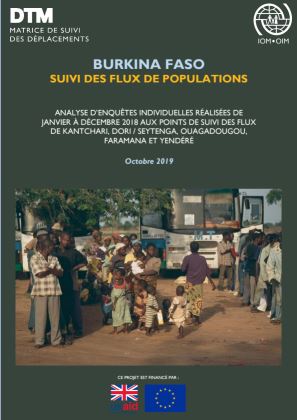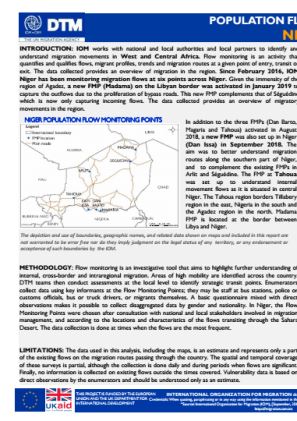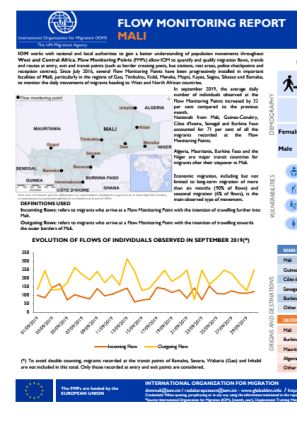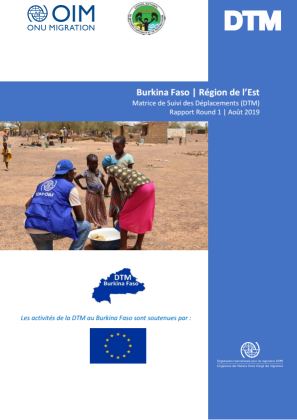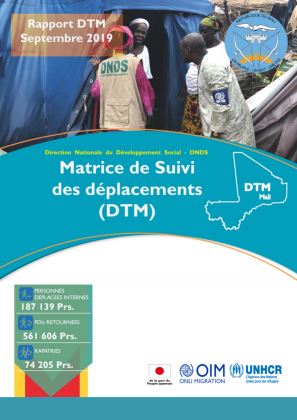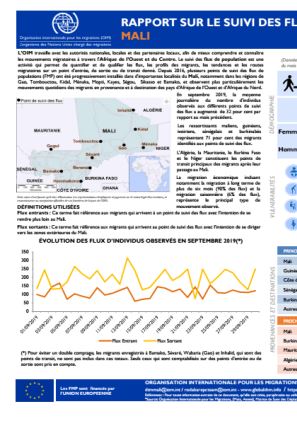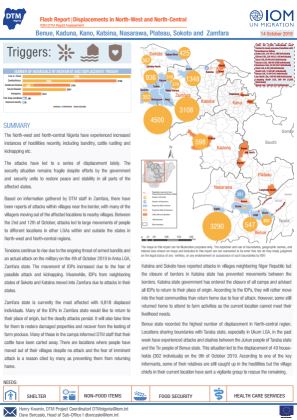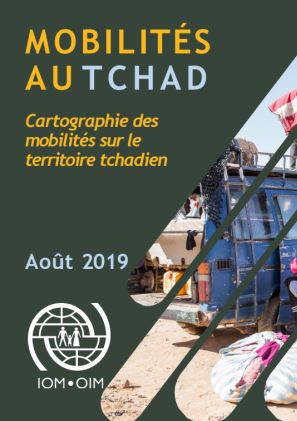-
Countries
-
Data and Analysis
-
Special Focus
-
Crisis Responses
West and Central Africa
DTM West and Central Africa
DTM Operations in the region
- Active DTM operation
- Past DTM operation
Nigeria - CMFS: Demographic and Economic Profile of Nigerian Migrants to Europe (2017)
This report is based on data collected through DTM’s Comprehensive Migration Flows Surveys (CMFS) in 2016, methodology that aims to enable a better understanding of migration flows from Nigeria towards Europe.
Chad — Transhumance Tracking Tool Dashboard 1 (August 2019)
As part of the prevention and management of agro-pastoral conflicts, IOM is implementing a project in the département of Grande Sido (Moyen-chari
République Centrafricaine — Rapport sur les déplacements 8 (Août 2019)
La République centrafricaine est, depuis 2013, touchée par une crise politique, sécuritaire et humanitaire, caractérisée par des conflits entre groupes armés et des conflits communautaires, ayant induit des déplacements de populations importants.
Burkina Faso — Suivi des flux de populations — Analyse d'enquêtes individuelles (Janvier — Décembre 2018)
Ce rapport présente une analyse de 4 451 enquêtes individuelles effectuées au niveau de cinq Points de suivi des flux (Ouagadougou, Dori/Seytenga, Kantchari, Faramana et Yendéré) entre janvier et décembre 2018, dans le but de mieux comprendre les profils, parcours migratoires et besoins des voyag
Guinée — Rapport sur le suivi des flux migratoires 27 (Septembre 2019)
L’OIM travaille avec les autorités nationales, locales et des partenaires locaux, afin de mieux comprendre et connaître les mouvements migratoires à travers l’Afrique de l’Ouest et du Centre.
Burkina Faso — Rapport sur le suivi des flux de populations 30 (Septembre 2019)
L’OIM travaille avec les autorités nationales, locales et des partenaires locaux dans le but de mieux comprendre les mouvements migratoires à travers l’Afrique de l’Ouest et du Centre.
Nigeria — Emergency Tracking Tool Quarterly Report (July - September 2019)
During the period of July - September 2019, a total of 38,332 movements were recorded, composed of 19,173 arrivals and 19,159 departures.
Nigeria — Emergency Tracking Tool Report 141 (14 - 20 October 2019)
During the period of 14 – 20 October 2019, a total of 1,301 movements were recorded, which were composed of 910 arrivals and 391 departures.
Niger — Rapport sur le suivi des flux de populations 27 (Septembre 2019)
La DTM au Niger observe les flux migratoires à sept Point de suivi des flux (FMP) à travers le pays : Arlit, Séguédine/Madama, Magaria, Dan Barto, Dan Issa et Tahoua.
Niger — Flow Monitoring Report (September 2019)
DTM Niger monitors migration flows at seven key transit points around the country: Arlit, Séguédine/Madama, Magaria, Dan Barto, Dan Issa and Tahoua. In September 2019, 1,836 individuals were on average observed crossing FMPs daily.
Oct 21 2019
Niger — Flow Monitoring Report (September 2019)
Mauritanie — Nouakchott — Tableau de bord des cartographies et profils des migrants 1 (Avril — Mai 2019)
Ce tableau de bord présente les résultats d’enquêtes menées par l’OIM dans la ville de Nouakchott pour mieux comprendre les effectifs, le profil, la situation et les besoins de la population migrante subsaharienne dans la capitale.
Mauritanie — Nouadhibou —Rapport de cartographie et profils des migrants 2 (Mars — Avril 2019)
Ce rapport présente les résultats des entretiens menés en mars/avril 2019 par l’Organisation Internationale pour les Migrations (OIM) en Mauritanie à travers son Système de Suivi des Populations Mobiles auprès de migrants de la commune de Nouadhibou (Dakhlet Noaudhibou) en Mauritanie.
Nigeria — Emergency Tracking Tool Report 140 (7 - 13 October 2019)
From the period 7 – 13 October 2019, a total of 1,137 movements were recorded, which were composed of 856 arrivals and 281 departures.
Mali — Flow Monitoring Report 44 (September 2019)
In Mali, Flow Monitoring Points are set up at key transit locations across the country (Gao, Timbuktu, Kidal, Menaka, Mopti, Kayes, Segou, Sikasso and Bamako) to monitor the movements of travelers coming from and headed to other countries in West and North Africa.
Burkina Faso — Rapport sur les déplacements 1 (6—18 Août 2019)
Ce premier rapport de la DTM donne un aperçu de la situation dans la Région de l’Est au Burkina Faso, où les déplacements de population sont dus à l’insécurité liée aux violences des groupes extrémistes armés. Les informations présentées dans ce rapport ont été collectées du 6 au 18 Août 2019.
Mali — Rapport de déplacement (Septembre 2019)
La crise sécuritaire que le Mali a connu en 2012 a provoqué d’importants déplacements de populations tant à l’intérieur du territoire que vers les pays limitrophes. Au cours de ce round, 192 communes ont été évaluées.
Oct 17 2019
Mali — Rapport de déplacement (Septembre 2019)
Mauritanie — Nouadhibou — Tableau de bord des cartographie et profils des migrants 2 (Mars — Avril 2019)
Ce tableau de bord présente les résultats d’enquêtes menées auprès des migrants entre le 25 mars et 9 avril 2019 par l’Organisation Internationale pour les Migrations (OIM) à travers le Système de Suivi des Populations Mobiles, auprès de migrants de la commune de Nouadhibou (Dakhlet Nouadhibou) e
Mali — Rapport sur le suivi des flux de population 44 (Septembre 2019)
Au Mali, des points de suivi des flux (FMP) sont installés dans des lieux de transit clés du pays (Gao, Tombouctou, Kidal, Ménaka, Mopti, Kayes, Ségou, Sikasso et Bamako) afin d'enregistrer les mouvements de voyageurs en partance vers et en provenance d'autres pays en Afrique de l'Ouest et
Tchad — Rapport sur le suivi des flux de populations 30 (Septembre 2019)
L’OIM travaille avec les autorités nationales, locales et des partenaires locaux, afin de mieux comprendre les mouvements migratoires à travers l’Afrique de l’Ouest et du Centre.
Mauritanie — Nouadhibou — Tableau de bord des cartographies et profils des migrants 1 (Novembre 2018)
Ce tableau de bord présente les résultats d’entretiens et d’enquêtes menées entre le 8 et le 30 novembre 2018 par l’Organisation Internationale pour les Migrations (OIM) à travers le Système de Suivi des Populations Mobiles, auprès de migrants de la commune de Nouadhibou (Dakhlet Nouadhibou
Nigeria — Displacements in North-West and North-Central Flash Report (14 October 2019)
The North-west and North-central Nigeria have experienced increased instances of hostilities recently, including banditry, cattle rustling and kidnapping etc.
Nigeria — Flow Monitoring Report 31 (September 2019)
IOM works with national and local authorities in order to gain a better understanding of population movements throughout West and Central Africa.
Sénégal — Rapport sur le suivi des flux de populations 28 (Août 2019)
Au Sénégal, deux points de suivi sont installés depuis avril 2019 sur plusieurs lieux de transit importants à Kidira et Moussala; ceux-ci enregistrent plus particulièrement les mouvements quotidiens des bus de voyageurs en provenance et à destination du Mali, de la Gambie et de la Guinée-Conakry.
Tchad — Mobilités au Tchad: Cartographie des mobilités sur le territoire Tchadien (Août 2019)
Ce rapport est composé d'un ensemble d'infographies et des cartes de différentes tendances migratoires au Tchad Il traite d'un grand nombre de mouvements de population recensés depuis, vers et au sein du territoire Tchadien et dresse une vue générale des populations en mouvement.
Pagination
Pagination
- First page
- Previous page
- …
- 5
- 6
- 7
- 8
- 9
- 10
- 11
- 12
- 13
Pagination
- First page
- Previous page
- 1
- 2
- 3
- 4
- 5
- 6
- 7

